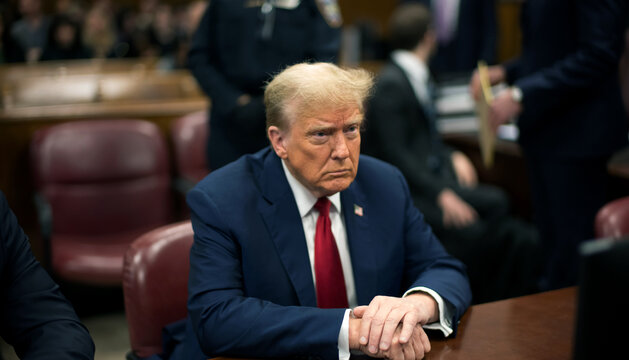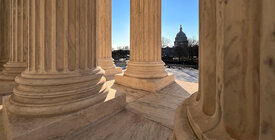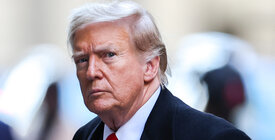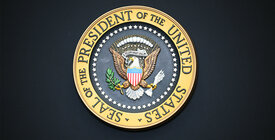
Spinning Hypotheticals, Justices Forget the Grim Facts of Trump’s Alleged Crimes
Two centuries of U.S. constitutional history make clear that Donald Trump is liable to criminal prosecution.

Part of
On Thursday, the U.S. Supreme Court finally heard argument on former President Trump’s claim that he’s immune from prosecution for trying to overturn the 2020 election. At least, that’s what everyone expected the argument to be about.
Many of the justices seemed uninterested in addressing the facts of Trump’s case. Over the course of the nearly three-hour argument, multiple justices speculated on possible scenarios involving future presidents and the hypothetical prosecutions they could encounter. Mostly absent from their comments were the actual allegations against former President Trump and the very real federal prosecution he currently faces. All this future-tripping made an easy question unnecessarily hard. We know from over two hundred years of history that, under any reasonable reading of the Constitution, Trump can’t be immune from criminal prosecution for trying to deny the democratic vote and upend the peaceful transfer of power.
When given the opportunity to consider Trump’s charges, several of the justices consistently steered the conversation to imaginary cases not before the court. Justice Samuel Alito wanted to talk “in the abstract.” Justice Neil Gorsuch agreed — he was “not concerned about this case so much as future ones.” And Justice Brett Kavanaugh offered that he was “not focused on the here and now of this case” but that he was “very concerned about the future.”
The court should be concerned instead with Trump’s indictment. Special Counsel Jack Smith alleges that Trump and his allies engaged in a concerted scheme to retain the office he lost in the 2020 election, a scheme that saw Trump promote false claims of election fraud, push state officials to ignore the results of the popular vote, organize slates of false electors, pressure the Justice Department to conduct sham election-crime investigations, and try to get Vice President Mike Pence to replace authentic electors with phony ones. Looking squarely at these charges shows just how ridiculous it would be to rule for Trump.
Looking to American history makes it even more ridiculous. When Justices Alito, Gorsuch, and Kavanaugh gestured towards the future, they implied that they were worried about creating a new rule that presidents are not immune from prosecution. But presidents have always been liable to be prosecuted. It’s a foundational part of our constitutional order and the background principle against which all presidents have done their jobs since the Founding.
The Founders fought a war to rid themselves of abusive executives — King George III and his royal governors — who were endowed with what John Adams described as the “badges of domination called prerogatives.” The king’s prerogatives included the privilege to stand above the law and not be prosecuted for crimes. The king, in other words, could claim the very immunity that Trump now seeks.
The Founders didn’t make the president a king. No one who had a hand in drafting the Constitution thought the president should be above the law. When James Madison invited discussion of potential presidential privileges at the Constitutional Convention of 1787, the other attendees rebuffed him — even those who were most inclined toward a powerful executive.
When the newly drafted Constitution went to the states for ratification, its advocates reassured the public that the new president would not be a king, untouchable by the law. As James Iredell, later a Supreme Court justice, put it when speaking in North Carolina, if the president “commits any crime, he is punishable by the laws of his country.” Or as Pennsylvania delegate Tench Coxe wrote, the president “may be proceeded against like any other man in the ordinary course of law.”
This understanding has endured for nearly 250 years. Had there been no risk of criminal prosecution, it would have made no sense for President Gerald Ford to offer a pardon to President Richard Nixon on the latter’s resignation (or for Nixon to accept the offer). Nor would it have made sense for President Bill Clinton to enter a plea deal with federal prosecutors when he left office. But all three presidents acted as they did because they understood what former President Trump fails to: when presidents leave office, they can be prosecuted just like anyone else.
Several justices suggested that the Court might create a new rule that former presidents are immune to criminal prosecution for their “official” acts, but not for “personal” acts. But Trump still wouldn’t be immune under that rule. He’s been indicted for interfering with the selection of the new president and the peaceful transfer of power, a constitutional process in which the incumbent president has no role, official or otherwise.
This is by design. The Framers themselves knew their history, and knew that earlier republics had crumbled due to executive intrigue. They feared a president might conspire with others to keep himself in office against the will of the people. So they carefully constructed checks on presidential power, including fencing presidents out of the election process. The promise that the people could vote presidents out — much like the promise that presidents could be prosecuted — was important to those who ratified the Constitution. Election interference of the kind alleged in the Special Counsel’s indictment is in the heartland of illegal acts the Framers feared, a crime against the entire constitutional order. There is no world where the immunity Trump wants would be consistent with that system.
For the justices to reach the right outcome, they need to turn away from the imagined future and focus on what we know now: the unimpeachable historical record and the startling allegations against Trump. Presidents have never been immune and Trump certainly can’t be immune for his crimes against the country.
More from the Trump Trials collection
-
History Proves That Presidents Can Be Held Accountable
The Supreme Court should move quickly to reject Trump’s claim to presidential immunity from criminal prosecution. -
Stop the Stall
The Supreme Court should get out of the way and let Trump’s federal trial begin. -
Founding-Era History Doesn’t Support Trump’s Immunity Claim
Historians Rosemarie Zagarri and Holly Brewer explain the anti-monarchical origins of the Constitution and the presidency.




